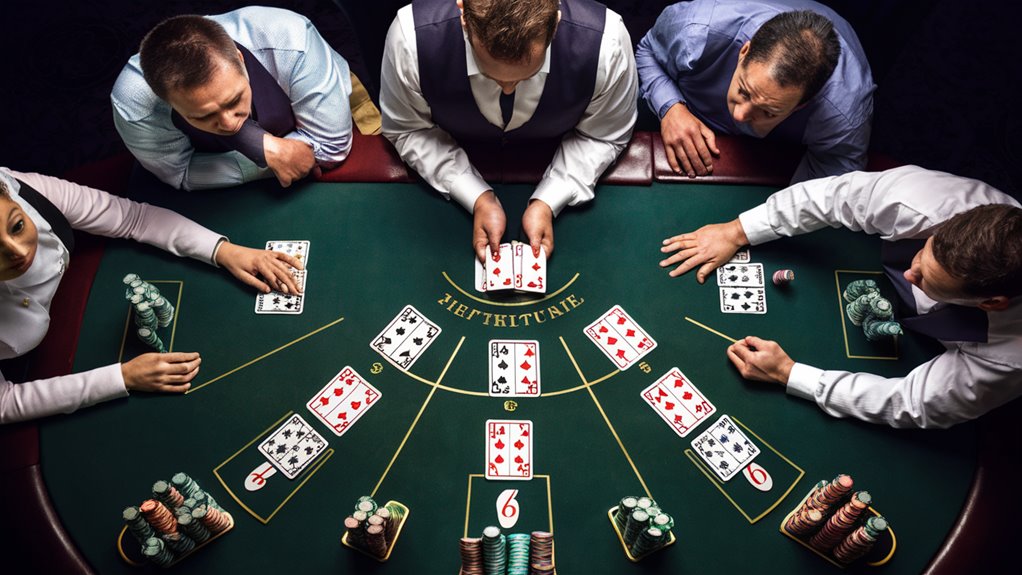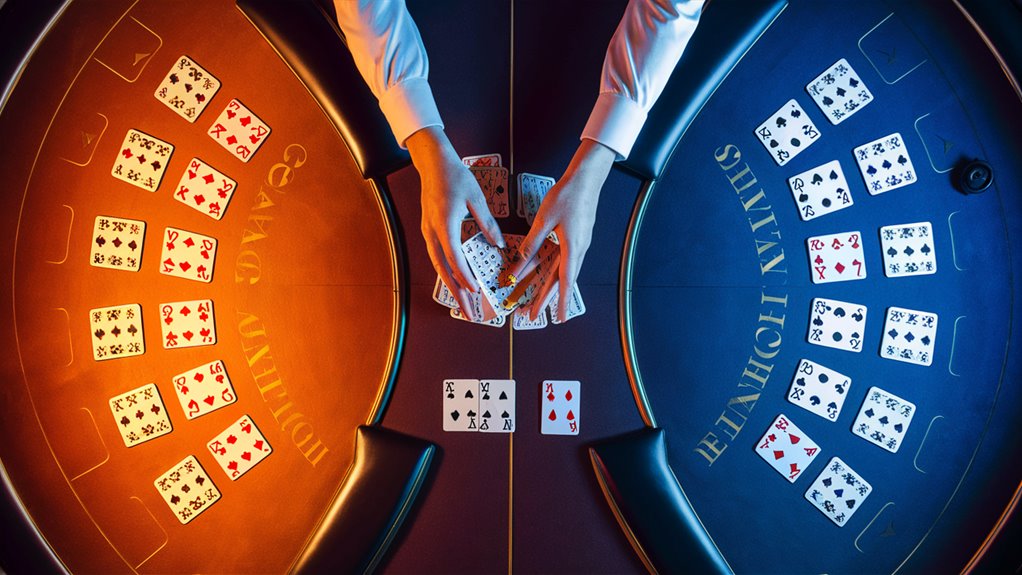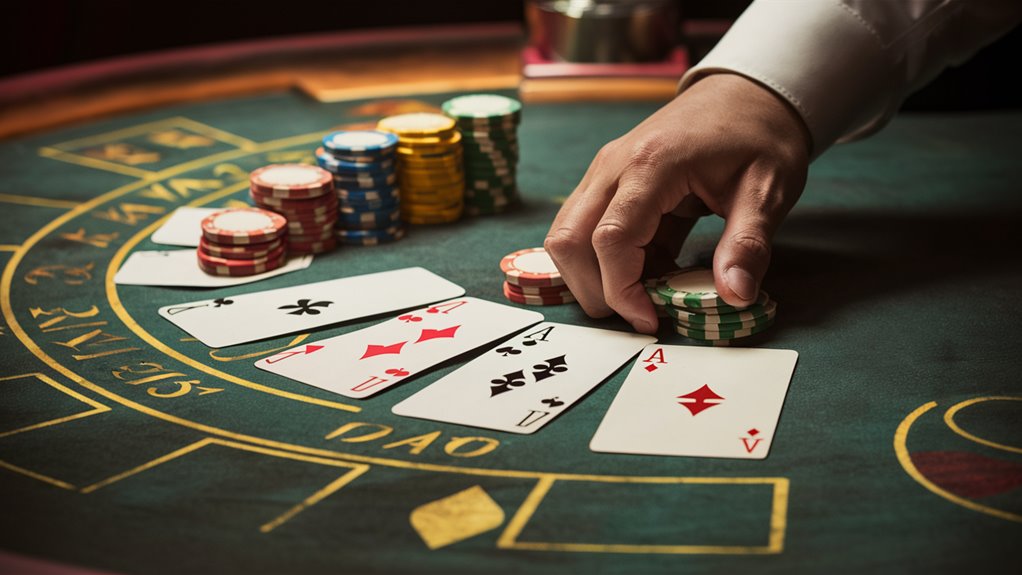Main Blackjack Myths: True Facts by Pros

What You Should Know About Betting Plans
Betting systems do not beat the house edge of 0.5-2% in blackjack. Many people think that strategies like raising bets and adding more after losses will fail against table limits. The truth of odds remains the same regardless of your betting style. 이 사이트에서 자세히 보기
Choices by Players and Game Flow
One player’s decisions do not affect the luck of others at the table. Each hand is its own independent event, making it difficult for one player’s choices to impact your game outcomes. This contradicts the common misconception that bad players disrupt the table.
Counting Cards and House Rules
Although card counting is legal in most places, casinos can still choose to prohibit you. Utilizing technology to count is not allowed and can result in significant legal issues. Awareness of this is crucial for frequent players.
How Stats Really Work
The idea of “hot” or “cold” tables is merely a myth. Previous hands do not influence future outcomes as every deal is a stand-alone event. This principle of odds holds true regardless of perceived patterns.
Looking at Insurance Bets
Insurance bets have a significant 7.4% house edge, typically resulting in losses. Such bets are only favorable when the true count exceeds +3 during card counting. Unless skilled at maintaining precise counts, it’s advisable to avoid insurance bets.
The Real Talk on Betting Systems in Gambling
Why Betting Plans Do Not Beat the House Edge
Betting systems like the Martingale strategy are common myths in gambling. While they might seem clever, these approaches cannot overcome the hard truth of the house’s inherent edge, which ranges from 0.5% to 2% in games like blackjack. Piercing Foggy Rounds With Explosive Splits
The Big Problems With the Martingale Plan
The Martingale strategy, which involves increasing bets after each loss, quickly becomes unmanageable. Starting with a $10 bet:
- After 7 consecutive losses: requires $1,280 for the next bet
- After 10 consecutive losses: requires $10,240 for the next bet
Two major limitations render this strategy ineffective:
- Table limits prevent constant bet doubling
- A substantial amount of money is necessary
The Math of Popular Betting Plans
Other betting strategies like the D’Alembert and Fibonacci share similar weaknesses:
- Cannot alter your actual odds of winning
- Each hand is an independent event
- The house edge persists, regardless of your betting pattern
Proven Ways to Cut the House Edge
Genuine methods to improve your gambling odds include:
- Mastering basic strategy
- Learning card counting
- Maintaining consistent bets
These techniques focus on skill enhancement, not merely modifying bet sizes, offering a real opportunity to reduce the house edge. Lantern Arc Slots: Illuminating
Bad Players Do Not Hurt Your Odds
How Other Players Affect Your Blackjack Odds
The Myth of “Bad Players” in Blackjack
Many individuals in the blackjack community mistakenly believe that “bad players” negatively impact the odds for others.
This prevalent belief contradicts fundamental math facts and stems from flawed reasoning about outcomes.
The Math of Each Player Being Solo
Every blackjack hand is an independent event, meaning others’ decisions have no bearing on your long-term results.
Regarding suboptimal play:
- A player’s deviation from standard strategy and corresponding loss is memorable
- Instances where unconventional plays succeed often go unnoticed
- Random odds ensure positive and negative effects balance out
Math Proof and Study
Mathematical models clearly demonstrate that other players’ decisions have no substantial impact on your expected returns.
Factors truly affecting your odds include:
- Established game rules
- Number of decks in use
- Your own informed choices
Maxing Out Your Wins
Instead of focusing on others’ decisions, effective blackjack play involves:
- Understanding basic strategy thoroughly
- Comprehending optimal betting
- Playing with caution
- Adhering to your well-informed choices
Elevating your game entails adhering to solid mathematical principles and maintaining a strategic approach.
Card Counting Is Not Allowed
The Law on Counting Cards in Casinos: Facts and Rules

U.S. Laws on This
Card counting in blackjack is completely legal under U.S. federal and state laws.
Tracking cards mentally through mathematics is permissible in gambling, an important distinction aiding comprehension of casino regulations.
What Casinos Can and Can’t Do
Despite card counting being legal, private gaming establishments can still ask card counters to leave. Casinos typically implement the following measures:
- Initial warning
- Exclusion from specific games
- Complete ban from the premises
- Inclusion on a shared exclusion list
The Illegal Ways to Count
Utilizing gadgets and machinery explicitly violates regulations. Prohibited actions include:
- Using a phone for assistance
- Receiving aid from a computer
- Employing external devices
- Utilizing machines for card tracking
What Casinos Do to Stop You
Modern casinos deploy intelligent countermeasures against counting:
- Continuous card shuffling devices
- Dealing from multiple decks
- Advanced surveillance systems
- Software that identifies patterns
- Frequent deck changes
Rules from Gaming Boards
The Nevada Gaming Board and others explicitly prohibit:
- Automated counting gadgets
- Devices providing any assistance
- Utilizing external tools
- Organized card counting teams
This comprehensive set of regulations ensures fairness while protecting both player rights and casino interests.
Hot and Cold Tables
The Real Deal on Blackjack Tables Being Hot or Cold: A Stats Breakdown
What’s Up With Streaks in Blackjack
The notion of hot and cold blackjack tables persists as one of the most enduring myths in gambling.
Players often attribute win or lose streaks to tables being “hot” or “cold,” despite definitive mathematical evidence to the contrary.
Each blackjack game is a singular chance occurrence, unaffected by previous outcomes.
The Math of How Tables Do
The house edge in blackjack remains around 0.5% if basic strategy is used, regardless of past events.
Comprehensive statistics from numerous recorded blackjack games show no intrinsic patterns in table performance.
When players switch from “cold” tables to seek “hot” ones, they fall victim to the gambler’s fallacy – a flawed understanding of odds.
Random Stuff and Finding Patterns
Intrinsic randomness generates seemingly substantial streaks, but they are just random clusters in standard probability distributions.
Like flipping multiple heads in a row during a coin toss doesn’t change subsequent odds, blackjack games adhere to pure mathematical odds.
Table results remain unconnected to prior outcomes, rendering the hot/cold table concept mathematically impossible.
How It Should Change How You Play
Understanding this truth should influence decision-making.
Intelligent blackjack play entails:
- Following basic strategy irrespective of perceived patterns
- Acknowledging that changing tables based on past results is ineffective
- Relying on mathematical odds rather than pattern recognition
- Resisting emotional influence from recent outcomes
Insurance Is Smart Safety
How Insurance Bets Work in Blackjack: Are They Safe or A Money Pit?
The Real Talk on Blackjack Insurance
Insurance bets in blackjack are among the most misunderstood facets of the game, often resulting in monetary losses for players.
Even when the dealer’s ace causes concern, understanding the precise mathematics behind insurance can prevent financial losses.
The Clear Math
The specific odds of insurance bets are straightforward. When a dealer displays an ace, a ten-value card (10, Jack, Queen, or King) is needed to complete blackjack.
In a single-deck game, only 16 out of 51 cards have ten values. For insurance to be equitable, it should pay 3.19:1, yet casinos only offer 2:1 odds.
The True Cost of Insurance
House edge calculations indicate that insurance bets carry approximately a 7.4% disadvantage for players.
This percentage is substantially higher than the 0.5% house edge associated with playing optimally. Even skillful card counters only find insurance profitable when the true count exceeds +3, deeming it an unfavorable choice for most.
What Strategy Shows
Foregoing insurance bets is fundamental for informed blackjack play.
The perceived safety of these bets is actually inferior to simply playing the main game correctly according to sound strategy principles. To maximize expected returns, avoid insurance, regardless of betting or table position.
